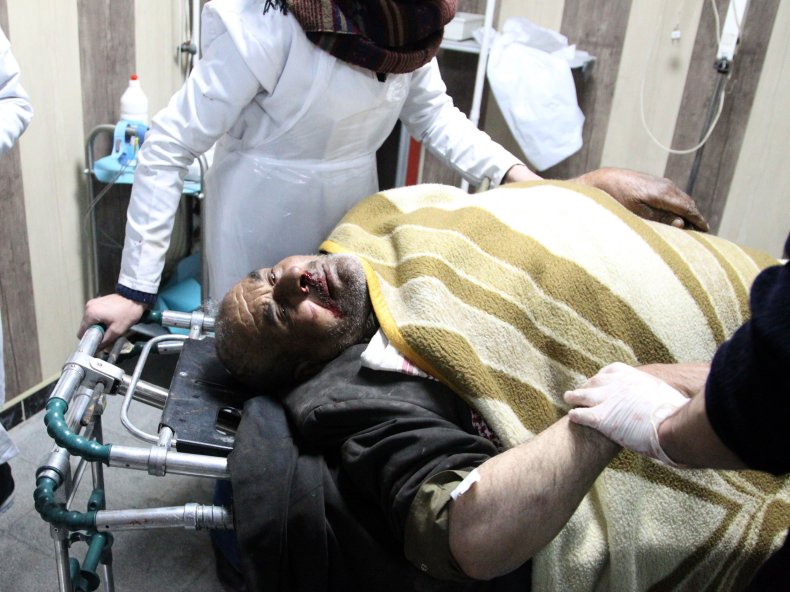BY DAVID BRENNAN ON 2/27/2020
The nine-year Syrian Civil War rages in the northwestern province of Idlib as President Bashar al-Assad seeks to crush the final bastion of resistance against his regime. The rebels in Idlib—mostly Islamist militias, the strongest of which is Hayat Tahrir al-Sham which was formerly allied with Al-Qaeda—are supported by Turkish forces. On the other side, Assad's troops are backed by Russian airstrikes and special operations troops, plus Iranian-aligned militias.
The battle is proving one of the war's most intense.
Airstrikes, rocket attacks, heavy artillery barrages, and armored assaults occur daily. Idlib's civilians are caught in the middle, and more than 900,000 people have fled their homes amid the fighting.
Civilian targets are not off limits. Russian and Syrian forces have been accused of intentionally targeting medical centers which are protected under the Geneva Convention are continuously attacked.
According to Médecins Sans Frontières, whose volunteers are working alongside local staff, the remaining medical facilities are on the verge of collapse under "indiscriminate" attacks.
"The health system is barely standing," Cristian Reynders, the Médecins Sans Frontières project coordinator for northwestern Syria, told Newsweek on Thursday from an MSF coordination office in the region.
"We do our best to respond, but we are overwhelmed," Reynders explained. Hospitals are "sanctuaries" from the fighting that "must be respected" by all actors, he said. But aside from urging combatants to respect hospital neutrality, the MSF and those on the ground are "powerless," Reynders added.
Medical staff are grappling with multiple attacks in multiple locations on avowedly civilian targets, Reynders said. The trend is "very, very worrying," he said.
MSF supports three regional hospitals. Two of the hospitals it supports—Idlib Central and Mareet Misirin—were almost hit by bombs or shells on Tuesday, which landed within 330 feet of both centers. Indeed, four medics working for Idlib Central hospital sustained minor blast wounds.
MSF recorded 185 wounded people on Tuesday, 66 of whom had severe wounds requiring major surgical operations. At least 14 of those were children. Lacking basic supplies like bandages and gauze, treatment is limited.
The number of ongoing medical operations has ravaged anesthesia stocks, leaving surgeons with inadequate supplies to treat the patients such as those missing limbs.
At certain points during the offensive, surgeons have been conducting 30 major surgeries per day, Reynders said.
Recorded messages from medical workers at the Idlib Surgical Hospital—provided to Newsweek by MSF—illustrate the chaos and suffering in Syria's last significant pocket of resistance. The center is in the city of Kafr Nabl, right on ever-shifting frontlines.
The manager of the hospital's media and documentation department said the regime and Russian bombing targeted schools and a health facility in the city. A surgeon at the hospital described Tuesday as "a difficult, bloody day," as workers struggled to treat dozens.
A nurse at Idlib Surgical warned that without international intervention, the "inhuman, systematic bombing" would continue.
Medical workers continue to treat civilians caught in the fighting. Reynders said he could not say if and when the volunteers and staff might leave, expressing his respect for the "impossible" choices they make in deciding whether to treat their patients or to flee.
"Nobody knows what will happen in 10 minutes or in one hour," he added. "We are on our toes all the time and doing our best."
Idlib was home to some 3 million people—half of them refugees from elsewhere in Syria—before the latest regime offensive began in December. Those who have fled have "nowhere to stay, nowhere to go," Reynders said. The United Nations has described the humanitarian crisis in Idlib as "horrifying," according to NPR, with countless displaced people sleeping outside with no shelter because refugee camps are full.
Calls for a ceasefire have thus far fallen on deaf ears, and all combatants have vowed to continue and even escalate the fighting. This means more shells and bombs for civilians and medical workers, Reynders said, until the two sides can reach a detente.
MSF and other organizations are responding to the humanitarian crisis as best they can, but Reynders noted that this is a "human crisis" which is too big for them to manage. "There is another level of responsibility that must be taken by the international community, by state actors that have the power to enforce international humanitarian law."

No comments:
Post a Comment